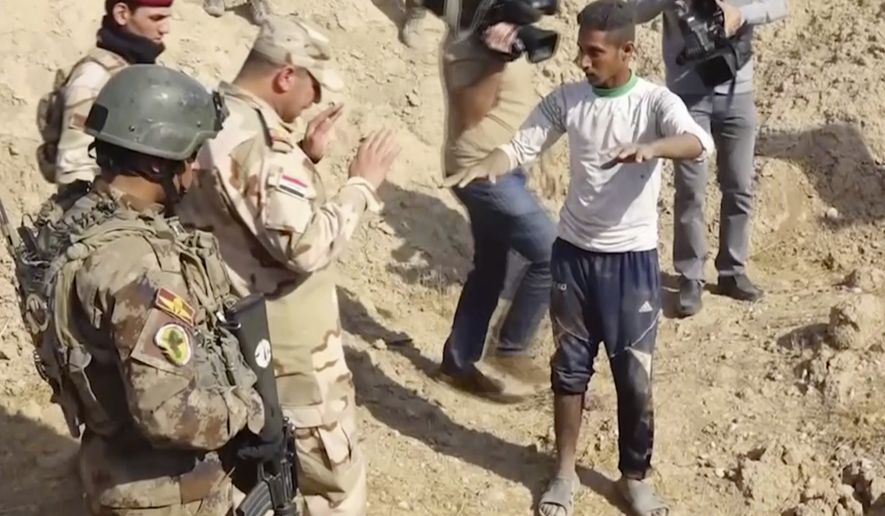U.S. and coalition commanders remain adamant Iraq’s government and military leaders can keep the Iranian-backed Shia militias under control, as the war against Islamic State comes to a close and regional powers look to take advantage of the ensuing chaos in the country.
“We have complete confidence” in the government of Iraqi Prime Minister Haider al-Abadi’s control of the Shia paramilitaries, known as Popular Mobilization Forces, or PMFs, Col. Ryan Dillon, the top U.S. spokesman in Iraq, told reporters Tuesday.
His comments come amid reports that units attached to two PMF units, Kata’ib Hezbollah and Harakat al-Nujaba, linked up with members of the Lebanese terror group Hezbollah during the liberation of the Islamic State-held Syrian border town of Abu Kamal.
Syrian government officials, who are fighting alongside Hezbollah-affiliated militias and backed by Russian airpower, announced Wednesday the border town had been freed from the Islamic State’s grasp.
“The last stronghold of Daesh, Albu Kamal, is free of the Daesh organization,” a Syrian military commander told reporters last week, using the derogatory Arabic term for the Islamic State, also known as ISIS.
But on Tuesday, Col. Dillon said coalition officials did not know both Iraqi PMF units had connected with Hezbollah fighters allied with Damascus at Abu Kamal, until press reports detailed the meeting of those forces. Coalition officials were not privy to the PMF movements, since commanders do not interact at all with the Shia groups.
“We do not have a say in which Iraqi forces go where, particularly the Popular Mobilization Forces,” Col. Dillon told reporters at the Pentagon, during a briefing from Baghdad.
Mr. Abadi federalized the PMFs, essentially making them part of the Iraqi security forces, in the weeks leading up to Baghdad’s campaign to liberate the northern Iraqi city of Mosul, which had been the Islamic State’s de facto capital in the country.
But the PMFs presence in Syria is again raising concerns that Iran is using the fight against the Islamic State as a cover, to establish a so-called “Shia crescent” stretching from Tehran into the Mediterranean.
Mr. Abadi’s decision to federalize the Shia militias, and use them to devastating effect in offensives against the Islamic State in Tal Afar and Hawija has only strengthened Tehran’s hand in Iraq, analysts say.
Iraqi Vice President Osama al-Nujaifi didn’t mince words regarding the alliances of the majority of the Shia militias during a speech in Washington last week.
“Some have no problems, some have affiliations and loyalty” to Iran and not the central government in Baghdad, he told the audience at the U.S. Institute for Peace. “They have their own political aspirations, their own [political] agendas.”
Acting as a “parallel force to the Iraqi military” under the direct control of Mr. Abadi, “they are very dangerous to the future of Iraq,” Mr. al-Nujaifi said.
• Carlo Muñoz can be reached at cmunoz@washingtontimes.com.




Please read our comment policy before commenting.